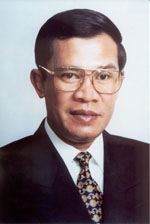| |

(Photo compliment from: Mr. Sum Sitha)
Samdech Hun Sen Biography
Born on August 5, 1952
(officially on April 4th, 1951) in Peam
Koh Sna Commune, Stoeung Trang District of Kampong
Cham Province, upon completion of his local primary
schooling, in 1965 Hun Sen came to Phnom Penh to
continue his secondary education in the Lycée Indra
Devi. He resided in Neakavoan Pagoda.
In 1970 Cambodia was plunged
into war. Responding to the appeal of Prince
Sihanouk to Cambodians to join the war against the
imperialists, at the age of 18, Hun Sen joined the
struggle movement, which liberated the country on
April 17, 1975.
One day before the victory,
on April 16, 1975, Hun Sen was wounded in the left
eye. Recovering after months of treatment, he
married Bun Rany. Not long afterward, having
witnessed the Pol Pot regime's policy of genocide,
in 1977 he left his beloved family again to lead a
movement aimed at liberating Cambodia and its people
from the genocidal regime. In 1978, Hun Sen became a
founding member of the United Front for the National
Salvation of Kampuchea (UFNSK). In collaboration
with other patriotic movements and with the support
of Vietnamese volunteer forces, on January 7, 1979,
the UFNSK rescued Cambodia and its people from the
genocidal regime of Democratic Kampuchea.
From 1979 to 1993, Hun Sen
held various positions in the Cambodian
administrations – the People's Republic of Kampuchea
and then the State of Cambodia. As Foreign Minister
in 1979, as Deputy Prime Minister and Foreign
Minister from 1981 to 1985, and then as Prime
Minister and Foreign Minister from 1985 to 1991, Hun
Sen brought about several remarkable achievements,
laying the basis for the implementation of peace,
national reconciliation, and the development of
Cambodia. Through his willing contribution and
efforts, Hun Sen proved an indispensable architect
of the Paris Peace Agreement on Cambodia.
As a result of the
implementation of the Agreement and the 1993
national elections, from 1993 to 1998 Hun Sen served
Cambodia as the Co-Premier and then the second Prime
Minister of the first coalition government. In this
position, he again proved to be an earnest defender
of national achievements and of the Paris Peace
Agreement. His achievements in this period included
fulfilling commitments to the improvement of rural
roads, schools, dispensaries and health care
centers, and access to clean water.
In July 1998, the general
election brought victory to the Cambodian People's
Party, of which Hun Sen is the Vice President. He
became the sole Prime Minister of the Kingdom of
Cambodia, leading the second coalition government of
the two major parties – the CPP and FUNCINPEC – and
solemnly declared his Government to be an
"economy-oriented government." Under his leadership
Cambodia became the 10th member of the
Association of South-East Asian Nations (ASEAN).
For his great efforts and
contributions to national reconciliation, peace, and
the socio-economic development of Cambodia, Hun Sen
had been awarded the title of "Samdech" by His
Majesty the King and a World Peace Award. He has a
B.A. in Politics from the Cambodian Tertiary
Education, a Ph.D. in Political Science from the
National Political Academy in Hanoi (1991), and two
Honorary Doctorates -- a Ph. D. in Politics from the
Southern California University for Professional
Studies, USA (1995), and a Ph.D. of Law from Iowa
Wesleyan College, USA (1996).
On December 02, 1996, the World Peace Academy
presented Samdech Hun Sen with the World Peace
Award. As the sixth person, and the first in South
Asia, to attain this honorable award, the Academy
conferred three titles on Samdech Hun Sen -- 1) the
Human Cultural Asset, 2) the Roving Ambassador for
Peace, and 3) the World Peace Congressman.
On April 10, 2001, in
Seoul, the Awarding Committee of Graduate School of
Dankook University in South Korea bestowed the
Honorary Doctorate in Political Sciences upon Prime
Minister Samdech Hun Sen in recognition of
contributions to the recovery of peace and stability
in Cambodia, the improvement of diplomatic relations
between Cambodia and the Republic of Korea, and his
efforts towards East-Asian cooperation.
On November 15, 2001,
Samdech Hun Sen was bestowed with the Honorary
Doctorate Degree of Political Science (Honoris Causa)
in the field of Foreign Relations from the
University of Ramkhamhaeng, Thailand.
On December 22, 2001, Sri Chinmoy of the
International Peace Center presented Samdech Hun Sen
with "Lifting Up the World with a Oneness-Heart"
Award. It was presented in recognition of
achievements scored by Samdech Hun Sen both in
quantitative and qualitative terms. Sri Chinmoy
refers to Samdech Hun Sen as an instrument selected
by the Lord Buddha to save millions of people of
Cambodia from deaths, to provide them with
education, food and shelters, to build them schools,
hospitals and water canals, and to lead Cambodia
into ASEAN.
On August 6, 2002, Samdech
Hun Sen was admitted as a member the Academy of
Natural Sciences of the Russian Federation and was
conferred with a medal in recognition of his
leadership in bringing peace, stability and
socio-economic development for Cambodia.
On September 04, 2002, the Committee of ASEAN
Engineering Federation (AFF) presented Samdech Hun
Sen with the title of "ASEAN Distinguished Honorary
Fellow Member" -- the AEF's highest honorary title
and the first one ever presented. This is to
recognize his national consciousness and leadership
ability in ending civil war, carrying all-field
rehabilitation and development, and giving
opportunity to Cambodian engineers to take part in
the process of national reconstruction and
development.
Hun Sen and Bun Rany have
three sons and three daughters (one of whom is
adopted): Hun Manet, Hun Mana, Hun Manit, Hun Mani,
Hun Mali, and Hun Malis.
|


